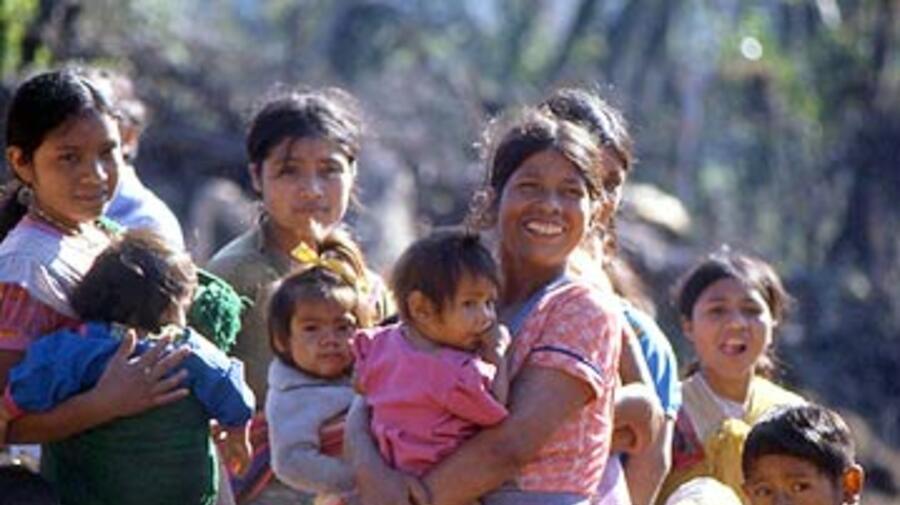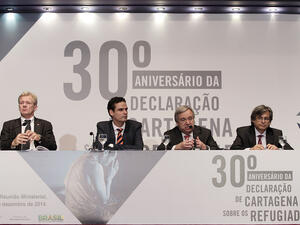Keeping the spirit of Cartagena alive, 20 years later
Keeping the spirit of Cartagena alive, 20 years later

Guatemalan refugees in Chiapas, Mexico. The Guatemalan refugee crisis in the '80s was one of the impetus for adopting the Cartagena Declaration in 1984.
CARTAGENA, Colombia, Nov 11 (UNHCR) - The UN refugee agency and countries in Latin America are gearing up to mark the 20th anniversary of a landmark document that broadened the refugee definition used in the region and offered an innovative approach to refugee protection and solutions.
Next Monday and Tuesday, High Commissioner Ruud Lubbers is scheduled to attend the commemoration of the 20th anniversary of the Cartagena Declaration on Refugees in Mexico City. Jointly organised with the Norwegian Refugee Council, this two-day meeting will involve representatives from 18 Latin American countries, as well as some 60 prominent personalities and representatives from other countries and international and civil society organisations which have been invited as observers.
Next week's meeting follows four sub-regional preparatory meetings - Aug 12-13 in Costa Rica for government officials, refugee experts and civil society representatives from Mexico, Central America and some Caribbean countries; Aug 26-27 in Brazil for MERCOSUR countries plus Chile and Bolivia, and Sept 16-17 in Colombia for Colombia, Ecuador, Panama, Peru and Venezuela; and October 7-8 in Colombia with civil society organisations of Peru, Colombia, Ecuador, Panama and Venezuela.
The anniversary will be an opportunity to reaffirm the relevance, endurance and validity of the Cartagena Declaration, which has come a long way since its adoption in 1984.
In the 1980s, Central America was one of the main battlegrounds of the Cold War. What began essentially as social conflicts over the lack of land for poor peasants, unequal distribution of wealth and restricted enjoyment of civil and political rights, became proxy wars over ideology and geopolitics as the United States and the Soviet Union supported opposite sides in Nicaragua, El Salvador and Guatemala. As a result of these wars, over 2 million people were forced to abandon their homes and became refugees or internally displaced persons in their own countries.
Faced with this pressing humanitarian crisis, UNHCR and a number of government experts and eminent jurists from Latin America came up with an innovative and creative response which drew upon the rich Latin American tradition of asylum: the Cartagena Declaration.
Leonardo Franco, an Argentine expert on refugee issues who participated in the drafting of the Declaration, said that in addition to finding humanitarian solutions based on human rights principles for people affected by the wars, "the necessary dialogue and search for consensus between Central American countries involved in the drafting of the Declaration, contributed later on to peace in the region."
The Declaration takes its name from the historic city of Cartagena de Indias in Colombia, where it was adopted in November 1984. The Declaration is best known for widening the definition of refugees to include those who have fled their countries because their lives, safety or freedom have been threatened by generalised violence, foreign aggression, internal conflicts, massive violation of human rights, or other circumstances which have seriously disturbed public order.
This includes people like Pablo, a 28-year-old man who fled the conflict in Colombia and found asylum in neighbouring Ecuador: "I began to hear rumours and receive warnings. I knew many people were being murdered. People were convinced it was the work of the irregular armed groups, and I believed that too. I decided that the best thing was to leave. First I thought about moving somewhere else inside Colombia but the conflict is everywhere. Although things are difficult here in Ecuador, with the help of some friends, things are beginning to look better."
The extension of the definition of a refugee to categories of people not included in the 1951 Geneva Convention on Refugees is perhaps its greatest achievement, but the Cartagena Declaration goes beyond that. It is, in fact, a summary of principles of international law which provide for the humanitarian treatment of those in need of protection, encouraging the application of refugee law and human rights standards for the treatment of refugees. The Declaration, moreover, points to the complementary nature of refugee law, international human rights and international humanitarian law in the protection of refugees.
In the 20 years since its adoption, most Latin American states have either incorporated the Cartagena principles in their national legislation, or applied it in practice. Refugees from Latin America, most recently Colombia and Haiti, but also from Angola, Iraq, Liberia, Senegal, Sierra Leone and other countries, have found protection in Latin American countries thanks to the complementary application of the 1951 Convention and the Cartagena Declaration.
Almost all of the countries making up the MERCOSUR trade bloc (Argentina, Brazil, Paraguay and Uruguay, and associates Bolivia and Chile) have either incorporated the broader Cartagena definition in their legal frameworks, or apply it in practice. Whereas in the '70s these southern Latin American countries received refugees mostly from neighbouring countries, with the return of democracy to the region in the '80s and '90s, refugees began arriving from far further afield, in small but steady flows. States also began to create legal frameworks permitting a more systematic and comprehensive application of the UN Refugee Convention.
Bolivia was the first country in the MERCOSUR region to adopt implementing regulations in which it included the broader refugee definition contained in the Cartagena Declaration. Brazil followed, including the broadened definition in the refugee law which it adopted in 1997. It currently hosts the largest group of African refugees in Latin America: some 2,800 refugee men, women and children hailing from 24 African countries, in addition to other refugees from Latin America, the Middle East, Asia and Eastern Europe.
Angolans make up the largest group of African refugees, some 2,000 people. The majority have chosen to settle in Rio de Janeiro, and in São Paulo, Latin America's largest city. They have different professional backgrounds, and carry out very varied activities in this country where like in Angola, Portuguese is the official language.
Commenting recently on the 20th Anniversary of the Cartagena Declaration, Luis Paulo Barreto, Brazil's Vice-Minister of Justice and President of the national refugee committee CONARE, said that the commemoration provided an opportunity for countries in the region to provide innovative and effective solutions for the protection of refugees, at a time when restrictive policies are being adopted in several parts of the world.
Paraguay is another country that included the broader definition used in the Cartagena Declaration, when it adopted a refugee law in 2002. Chile and Argentina apply the Declaration in practice and, based on its precepts, have recognised refugees from a number of countries experiencing internal strife, including Colombia, Côte d'Ivoire, Haiti, Iraq, Liberia and Senegal. In both countries, the broader refugee definition is currently included in draft refugee legislation.
Nicolas Torrealba, Chief of the Migrations Service in Chile and President of the Refugee Committee, emphasised the importance of the Declaration to the work carried out by Chile's national refugee committee. "In practice, the Committee applies the Declaration in its totality, taking its concepts into account in the analyses of each case it deals with," he said.
Adriana Alfonso, Chief of the Office of International Affairs in Argentina's Migrations Service and head of the national refugee committee CEPARE, explains that CEPARE applied the Declaration to recognise asylum seekers from Iraq and Haiti who were already in Argentina when their countries became engulfed in conflict.
However, considerable ground still needs to be covered towards a wider application of the Declaration. Some governments have mentioned difficulties interpreting the Declaration and establishing criteria indicating a clear link between the objective circumstances described in its definition and threats to an individual's life and liberty.
The Declaration's 20th anniversary will launch a process of international cooperation to improve protection in Latin America and to address the humanitarian needs of people fleeing the violence in Colombia. It is proof that 20 years after its birth, the spirit of Cartagena still lives on.
By Nazli Zaki and Juan Igacio Mondelli in Argentina
with William Spindler in Venezuela




